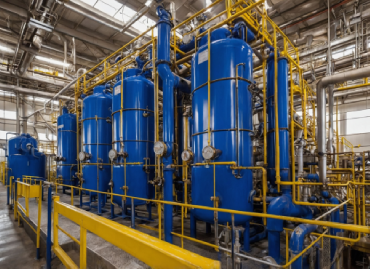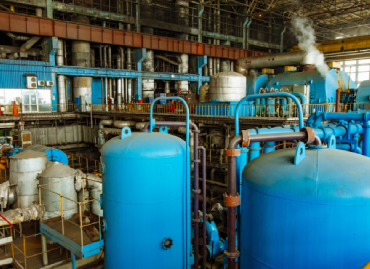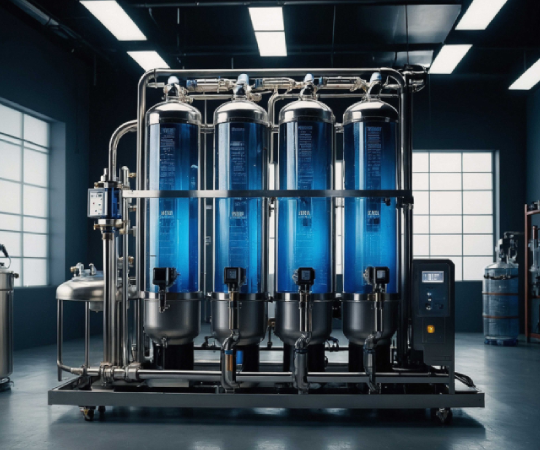- By Admin
- 14 Aug 2025
- WTP Plant
Advanced Water Treatment Solutions Ensure Sustainability and Compliance for Water Parks in India
Water parks have become an integral part of the entertainment landscape in India, particularly in Maharashtra, where they contribute not only to tourism but also to local employment. These parks, with their thrilling water rides, wave machines, and expansive pools, attract thousands of visitors every day, especially during peak seasons. The demand for water in such high-footfall environments is immense, placing a significant strain on natural water resources. As these parks continue to grow in size and popularity, managing water consumption responsibly has become not just an operational necessity but an environmental responsibility.
Water parks rely heavily on water for their core attractions—pools, slides, wave machines, and even the landscaping that adorns these spaces. The scale of water use in such facilities can be staggering, with millions of litres consumed every week. Additionally, water is required for cleaning and sanitation, as well as for maintaining guest facilities like showers, food courts, and cooling systems. Without an efficient and sustainable water management system, this demand would lead to excessive water waste, violating environmental norms and escalating operational costs.
"Water parks celebrate fun and recreation, but behind the scenes lies a profound responsibility to manage every drop. Treating and recycling water ensures sustainability, respects resources, and reflects the park's commitment to environmental stewardship. Proper water management is not just a practice—it's a promise to future generations."
Wastewater Production in Water Parks: A Major Concern
The daily operations at water parks contribute to a significant amount of wastewater. From pool water draining to maintaining clean facilities, much of the water used gets contaminated with chlorine, oils, soaps, body fluids, sunscreen residues, and organic matter. Showers, changing rooms, and food court facilities contribute to the load, generating wastewater with various contaminants. This wastewater, if left untreated, can pollute surrounding water bodies and cause significant harm to local ecosystems.
The main types of wastewater generated in water parks include greywater from showers and changing rooms, chlorinated water from pools, and wastewater from food courts and maintenance activities. Each of these types has distinct characteristics that require tailored treatment solutions. For example, pool water, which contains chlorine, needs to undergo dechlorination before it can be safely treated. Similarly, water from food courts often includes oils and fats, which require special grease trap systems to separate them before further treatment.


The Need for Effective Treatment Systems
Given the diversity of wastewater in water parks, effective treatment systems are essential for maintaining sustainability. Sewage Treatment Plants (STPs) are typically employed for handling domestic wastewater, while Effluent Treatment Plants (ETPs) are used to treat chemically laden water. Water Treatment Plants (WTPs) are responsible for purifying fresh water before it enters the park's attractions. The treatment process typically begins with sedimentation, followed by biological treatment to break down organic matter. Filtration and disinfection come next, often through chlorine neutralisation and activated carbon filtering. For more complex wastewater, Reverse Osmosis (RO) units are deployed to ensure the highest level of purification, making water safe for reuse.
The treated water can then be used for landscaping, pool replenishment, and even toilet flushing, reducing the demand on external freshwater sources. This recycling process helps parks maintain their operations while significantly cutting down on water consumption.
Integrating Advanced Technologies for Water Treatment and Recycling
As water scarcity continues to be a pressing concern, many water parks are turning to advanced technologies to optimise water treatment and recycling. Reverse Osmosis (RO) systems, Membrane Bioreactor (MBR) technology, and UV disinfection systems are becoming increasingly popular due to their effectiveness in purifying water for reuse. These systems help reduce the consumption of freshwater, thereby conserving vital resources while also ensuring compliance with environmental regulations.
Modern parks are also incorporating smart technology into their water management systems. Automated systems allow for real-time monitoring of water quality and usage. This helps park operators detect leaks, track water consumption, and ensure that all treatment processes are functioning optimally. Additionally, the integration of Internet of Things (IoT)-enabled sensors allows for remote monitoring, ensuring that any issues are detected and addressed immediately. Rainwater harvesting systems are also being incorporated to supplement the park's water supply, further enhancing sustainability.
Tailored Water Treatment Solutions for Water Parks Across India
Each water park has unique requirements when it comes to water and wastewater treatment. The volume of water used, the type of wastewater generated, and the specific environmental regulations vary from park to park. For this reason, customised water treatment solutions are essential. At our company, we specialise in designing and implementing tailored systems that address the unique needs of water parks. Whether it's an STP for managing domestic wastewater, an ETP for treating food court runoff, or an RO unit for purifying pool water, we ensure that our solutions are effective and compliant with all relevant regulations.
From the initial design and installation phase to regular maintenance and remote monitoring, we provide end-to-end solutions that ensure water parks operate efficiently and sustainably. Our team also offers operator training to ensure that staff are equipped with the knowledge and skills needed to manage the system effectively.
Summary And Conclusion
Water parks are a vital part of the entertainment industry, but they also bear a significant responsibility in managing water resources sustainably. Efficient water treatment systems, such as STPs, ETPs, WTPs, and advanced RO units, are critical for recycling and reusing water while maintaining the park's operations. By adopting smart technologies and customised water solutions, water parks can reduce their environmental footprint, lower costs, and comply with regulatory standards. Sustainable water management not only supports the park's growth but also ensures the protection of natural resources, creating a harmonious balance between recreation and environmental stewardship.































































